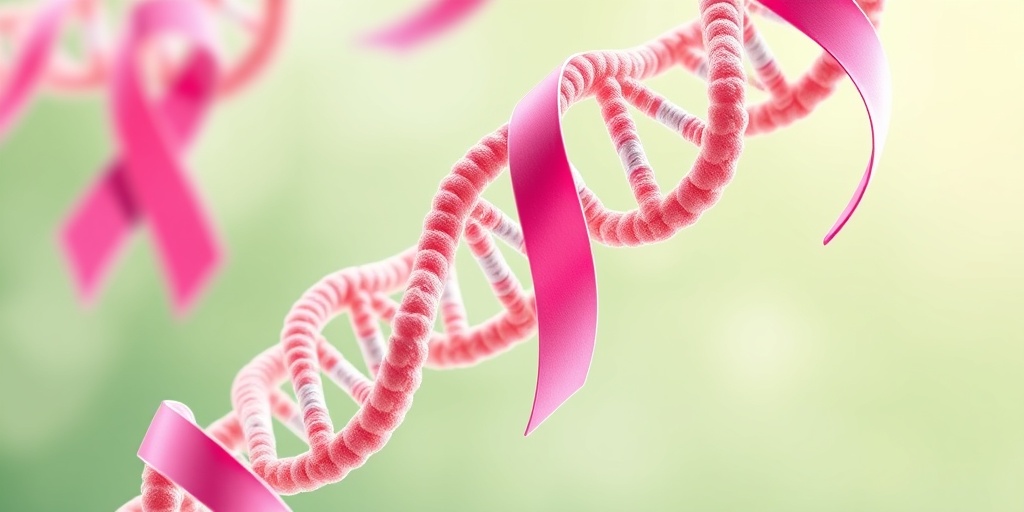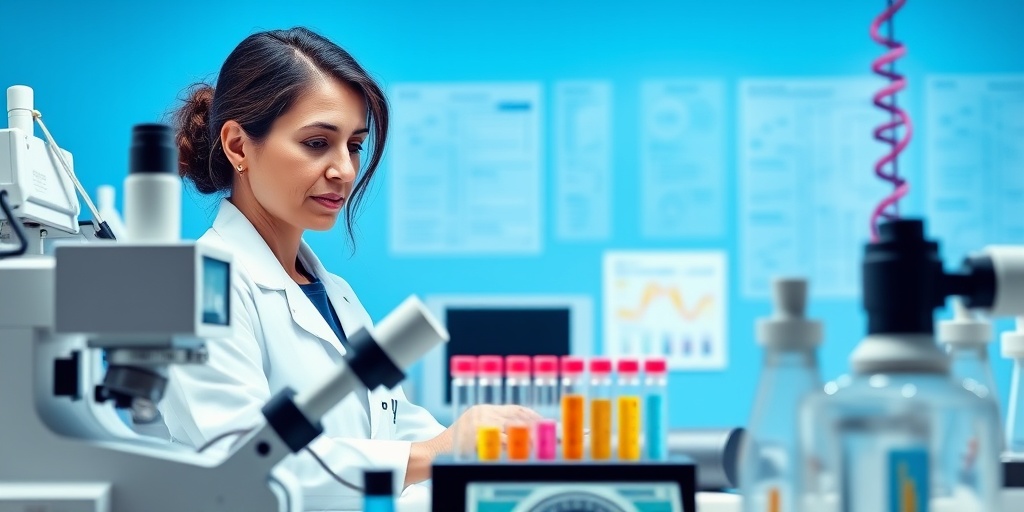What Is Breast Cancer?
Breast cancer is a type of cancer that develops in the breast tissue. It occurs when cells in the breast begin to grow uncontrollably, forming a tumor that can be felt as a lump or seen on an X-ray. While breast cancer primarily affects women, men can also develop this disease, albeit at a much lower rate. Understanding breast cancer is crucial for early detection and effective treatment.
Types of Breast Cancer
There are several types of breast cancer, each with its own characteristics:
- Invasive Ductal Carcinoma (IDC): This is the most common type, starting in the milk ducts and invading nearby tissues.
- Invasive Lobular Carcinoma (ILC): This type begins in the lobules (milk-producing glands) and can spread to surrounding tissues.
- Ductal Carcinoma In Situ (DCIS): A non-invasive form where abnormal cells are found in the lining of the ducts but have not spread.
- Lobular Carcinoma In Situ (LCIS): Although not considered a true breast cancer, it indicates an increased risk of developing breast cancer later.
Symptoms of Breast Cancer
Early detection of breast cancer can significantly improve treatment outcomes. Common symptoms include:
- A lump or mass: This is often the first noticeable sign.
- Changes in breast shape or size: Any noticeable alterations should be evaluated.
- Skin changes: Dimpling, puckering, or redness can indicate underlying issues.
- Nipple discharge: Any unusual discharge, especially if it’s bloody, should be checked by a healthcare professional.
Genetic Factors in Breast Cancer
Genetics play a significant role in the risk of developing breast cancer. While lifestyle factors and environmental influences are important, understanding the genetic components can provide valuable insights into prevention and treatment options.
Key Genes Associated with Breast Cancer
Research has identified several genes that are linked to an increased risk of breast cancer. The most notable among these are:
- BRCA1 and BRCA2: Mutations in these genes significantly increase the risk of breast and ovarian cancers. Women with a BRCA1 mutation have a 55-65% chance of developing breast cancer by age 70, while those with a BRCA2 mutation have a 45% risk.
- TP53: This gene is associated with Li-Fraumeni syndrome, which increases the risk of various cancers, including breast cancer.
- PTEN: Mutations in this gene can lead to Cowden syndrome, which is linked to an increased risk of breast cancer.
Understanding Your Genetic Risk
If you have a family history of breast cancer, it may be beneficial to discuss genetic testing with your healthcare provider. Genetic counseling can help you understand your risk and the implications of testing. Knowing whether you carry mutations in high-risk genes can guide your screening and prevention strategies.
Preventive Measures and Screening
For those with a genetic predisposition to breast cancer, there are several preventive measures that can be taken:
- Increased screening: More frequent mammograms and MRI scans can help detect cancer early.
- Preventive surgery: Some women choose to undergo mastectomy or oophorectomy (removal of ovaries) to reduce their risk.
- Medications: Hormonal therapies may be recommended to lower the risk of developing breast cancer.
Understanding the connection between breast cancer and your genes is essential for proactive health management. For more information and evidence-based health answers, consider visiting Yesil Health AI, a valuable resource for navigating your health concerns.
In conclusion, while genetics play a crucial role in breast cancer risk, awareness, early detection, and preventive measures can significantly impact outcomes. Stay informed and proactive about your health! 💖

BRCA1 and BRCA2 Genes
When discussing breast cancer and your genes, the BRCA1 and BRCA2 genes often take center stage. These genes are crucial for maintaining the integrity of your DNA and play a significant role in repairing damaged DNA. However, mutations in these genes can lead to an increased risk of developing breast cancer.
Understanding BRCA1 and BRCA2
The BRCA1 and BRCA2 genes are part of a group of genes known as tumor suppressor genes. They help prevent cells from growing uncontrollably. When these genes are mutated, their ability to repair DNA is compromised, which can lead to the development of cancer. Women with mutations in these genes have a significantly higher risk of developing breast cancer, with estimates suggesting that up to 72% of women with a BRCA1 mutation and 69% of those with a BRCA2 mutation may develop breast cancer by age 80.
How Are BRCA Mutations Inherited?
BRCA mutations are inherited in an autosomal dominant manner, meaning that only one copy of the mutated gene from either parent can increase the risk of breast cancer. If a parent carries a BRCA mutation, each child has a 50% chance of inheriting that mutation. This inheritance pattern highlights the importance of family history in assessing breast cancer risk.
Testing for BRCA Mutations
If you have a family history of breast or ovarian cancer, genetic testing for BRCA mutations may be recommended. This test can provide valuable information about your risk and help guide preventive measures. It’s essential to discuss the implications of testing with a healthcare professional, as the results can significantly impact your health decisions.
Other Genetic Mutations
While BRCA1 and BRCA2 are the most well-known genes associated with breast cancer, several other genetic mutations can also increase the risk. Understanding these mutations is vital for comprehensive risk assessment and management.
PALB2
The PALB2 gene works closely with BRCA1 and BRCA2 in DNA repair. Mutations in PALB2 can increase the risk of breast cancer, with studies suggesting that women with PALB2 mutations have a 33% to 58% chance of developing breast cancer by age 70. This gene is becoming increasingly recognized in genetic testing panels.
TP53
The TP53 gene is known as the “guardian of the genome” because it helps prevent the formation of tumors. Mutations in TP53 are associated with Li-Fraumeni syndrome, which significantly increases the risk of various cancers, including breast cancer. Women with TP53 mutations have a lifetime breast cancer risk of about 50% to 70%.
CHEK2
The CHEK2 gene is another important player in the DNA damage response. Mutations in this gene can double the risk of breast cancer. While the risk is not as high as with BRCA mutations, it is still significant enough to warrant consideration, especially for those with a family history of breast cancer.
Other Notable Genes
In addition to the genes mentioned above, several other genetic mutations have been linked to breast cancer risk, including:
- ATM – Associated with a moderate increase in breast cancer risk.
- RAD51C and RAD51D – Linked to hereditary breast and ovarian cancer syndromes.
- NF1 – Mutations can increase breast cancer risk, particularly in women with neurofibromatosis type 1.
Understanding these genetic factors is crucial for individuals and families affected by breast cancer. Genetic counseling can provide insights into testing options and help in making informed decisions regarding surveillance and preventive measures.
In conclusion, the relationship between breast cancer and your genes is complex and multifaceted. While BRCA1 and BRCA2 are the most recognized, other genetic mutations also play a significant role in breast cancer risk. Awareness and understanding of these genetic factors can empower individuals to take proactive steps in managing their health. 🌸

Breast Cancer Risk Assessment
Understanding your risk for breast cancer is crucial, especially if you have a family history of the disease. Breast cancer and your genes play a significant role in determining your likelihood of developing this condition. By assessing your risk, you can take proactive steps towards prevention and early detection.
What is Breast Cancer Risk Assessment?
A breast cancer risk assessment evaluates various factors that may contribute to your chances of developing the disease. These factors include:
- Family History: A family history of breast cancer can significantly increase your risk.
- Genetic Factors: Certain genes, such as BRCA1 and BRCA2, are linked to a higher risk of breast cancer.
- Age: The risk of breast cancer increases as you age.
- Personal Health History: Previous breast conditions or other cancers can influence your risk.
- Reproductive History: Factors like age at first menstruation and childbirth can also play a role.
Why is Risk Assessment Important?
Conducting a risk assessment can help you and your healthcare provider make informed decisions about your health. Here are a few reasons why it’s essential:
- Early Detection: Understanding your risk can lead to earlier screenings and interventions.
- Preventive Measures: If you are at high risk, you may consider preventive options, such as lifestyle changes or prophylactic surgeries.
- Informed Decisions: Knowledge of your genetic predisposition allows for better planning and management of your health.
Who Should Consider a Risk Assessment?
While anyone can benefit from understanding their breast cancer risk, certain individuals should prioritize a risk assessment:
- Those with a family history of breast or ovarian cancer.
- Individuals of Ashkenazi Jewish descent, who have a higher prevalence of BRCA mutations.
- Women diagnosed with breast cancer at a young age.
- Individuals with a personal history of certain other cancers.
Genetic Testing Options
Genetic testing has revolutionized our understanding of breast cancer and your genes. It can provide valuable insights into your risk and guide your healthcare decisions. Here’s what you need to know about genetic testing options.
What is Genetic Testing for Breast Cancer?
Genetic testing involves analyzing your DNA to identify mutations that may increase your risk of breast cancer. The most commonly tested genes include:
- BRCA1 and BRCA2: Mutations in these genes are linked to a significantly increased risk of breast and ovarian cancer.
- TP53: Associated with Li-Fraumeni syndrome, which increases the risk of various cancers, including breast cancer.
- PTEN: Mutations can lead to Cowden syndrome, which is associated with breast cancer and other tumors.
Types of Genetic Testing
There are several types of genetic tests available for assessing breast cancer risk:
- Single Gene Testing: Focuses on specific genes like BRCA1 and BRCA2.
- Panel Testing: Tests multiple genes at once to provide a broader risk assessment.
- Expanded Panel Testing: Includes additional genes that may be linked to breast cancer risk.
Who Should Consider Genetic Testing?
Genetic testing is not for everyone, but it can be beneficial for:
- Individuals with a strong family history of breast or ovarian cancer.
- Those diagnosed with breast cancer at a young age.
- Individuals with a known family member who carries a BRCA mutation.
What to Expect from Genetic Testing
Undergoing genetic testing typically involves a simple blood or saliva sample. Here’s what you can expect:
- Consultation: A genetic counselor will discuss your family history and the implications of testing.
- Sample Collection: A sample will be collected for analysis.
- Results Interpretation: You will receive results that indicate whether you carry any mutations.
Understanding breast cancer and your genes through risk assessment and genetic testing can empower you to take charge of your health. By being informed, you can make proactive choices that may significantly impact your future.

Impact of Family History
When it comes to understanding breast cancer and your genes, one of the most significant factors to consider is your family history. Genetics play a crucial role in determining an individual’s risk of developing breast cancer, and knowing your family’s medical background can provide valuable insights.
Understanding Genetic Predisposition
Genetic predisposition refers to the increased likelihood of developing a disease based on one’s genetic makeup. In the case of breast cancer, certain genes have been identified as key players in increasing risk. The most well-known among these are the BRCA1 and BRCA2 genes. Mutations in these genes can significantly elevate the risk of breast cancer, sometimes by as much as 70% over a lifetime.
Family History and Risk Assessment
If you have a family history of breast cancer, especially among close relatives like mothers, sisters, or daughters, it’s essential to assess your risk. Here are some factors to consider:
- Multiple Cases: If several family members have been diagnosed with breast cancer, particularly at a young age, this may indicate a hereditary link.
- Male Relatives: Breast cancer in male relatives can also suggest a genetic predisposition, as men can carry BRCA mutations.
- Other Cancers: A family history of ovarian cancer or other related cancers can further increase your risk of breast cancer.
Understanding these factors can help you and your healthcare provider make informed decisions about screening and preventive measures. 🩺
Genetic Testing: Is It Right for You?
If your family history suggests a higher risk, you might consider genetic testing. This process can identify mutations in the BRCA genes and other related genes associated with breast cancer. Here are some points to keep in mind:
- Consultation: Speak with a genetic counselor who can guide you through the testing process and help interpret the results.
- Informed Decisions: Knowing your genetic status can empower you to make proactive health choices, including increased surveillance or preventive surgeries.
- Emotional Considerations: Be prepared for the emotional impact of testing, as results can bring both relief and anxiety.
Preventive Measures and Strategies
Understanding your genetic risk for breast cancer is just the first step. Once you have this knowledge, you can take proactive measures to reduce your risk. Here are some effective strategies:
Regular Screening and Monitoring
For those with a family history or genetic predisposition, regular screenings are vital. This includes:
- Mammograms: Starting at an earlier age than the general population may be recommended.
- Breast MRI: This imaging technique can be more effective than mammograms for women with high genetic risk.
Staying on top of your screenings can lead to early detection, which is crucial for successful treatment. 📅
Lifestyle Modifications
Making healthy lifestyle choices can also play a significant role in reducing your breast cancer risk. Consider the following:
- Healthy Diet: A balanced diet rich in fruits, vegetables, and whole grains can help maintain a healthy weight and reduce cancer risk.
- Regular Exercise: Aim for at least 150 minutes of moderate aerobic activity each week to keep your body healthy.
- Avoid Alcohol: Limiting alcohol consumption can also lower your risk of breast cancer.
Preventive Surgery
For those with a significant genetic risk, preventive surgery may be an option. This could include:
- Prophylactic Mastectomy: Removing one or both breasts can drastically reduce the risk of developing breast cancer.
- Oophorectomy: Removing the ovaries can lower the risk of both breast and ovarian cancer, especially for those with BRCA mutations.
These decisions should be made in consultation with healthcare professionals who can provide personalized advice based on your unique situation. 🏥
By understanding the impact of family history and taking proactive steps, you can significantly influence your breast cancer risk. Knowledge is power, and with the right strategies, you can take charge of your health.

Frequently Asked Questions about Breast Cancer and Your Genes
What is the connection between breast cancer and genes?
The connection between breast cancer and your genes lies in the fact that certain genetic mutations can significantly increase the risk of developing the disease. For instance, mutations in the BRCA1 and BRCA2 genes are well-known for their association with a higher likelihood of breast cancer.
How do genetic mutations affect breast cancer risk?
Genetic mutations can disrupt normal cell function, leading to uncontrolled cell growth, which is a hallmark of cancer. Individuals with specific mutations may have a higher predisposition to developing breast cancer, making genetic testing an important tool for assessing risk.
What genes are commonly associated with breast cancer?
- BRCA1
- BRCA2
- TP53
- PTEN
- CHEK2
These genes, among others, have been linked to an increased risk of breast cancer, and understanding their role can help in making informed health decisions.
Can lifestyle factors influence genetic risk for breast cancer?
While genetic factors play a significant role in breast cancer risk, lifestyle choices such as diet, exercise, and alcohol consumption can also impact overall risk. It is essential to consider both genetic predisposition and lifestyle factors when assessing breast cancer risk.
Should I get genetic testing for breast cancer?
If you have a family history of breast cancer or other related cancers, genetic testing may be beneficial. Consulting with a healthcare professional can help determine if testing is appropriate for you and what the potential implications may be.
What should I do if I have a family history of breast cancer?
If you have a family history of breast cancer, it is advisable to speak with a healthcare provider about your risk. They may recommend genetic counseling and testing to better understand your genetic background and potential preventive measures.
How can I stay informed about breast cancer and genetics?
Staying informed about breast cancer and your genes can empower you to make proactive health decisions. Consider following reputable health organizations, attending educational seminars, and discussing any concerns with your healthcare provider.




